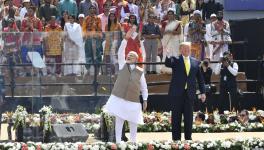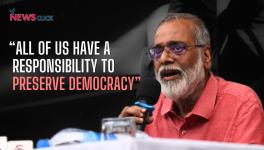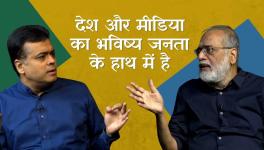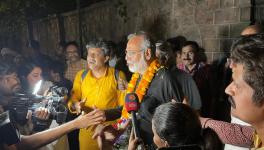Budget 2015: Acche Din for the Adanis
Newsclick discussed with Professor Surajit Mazumdar the Union Budget 2015. According to Prof Majumdar, this is a pro corporate budget, offering various subsidies to the rich and increasing the burden on the people. For the working people, there is increase in service tax and a Swach Bharat cess, while it cuts allocations from the most exploited sections in India -- cuts in the Tribal Sub Plan, the Gender Budget and the funds for Scheduled Castes. The funds for NREGA, though marginally increased, are far below what is required.
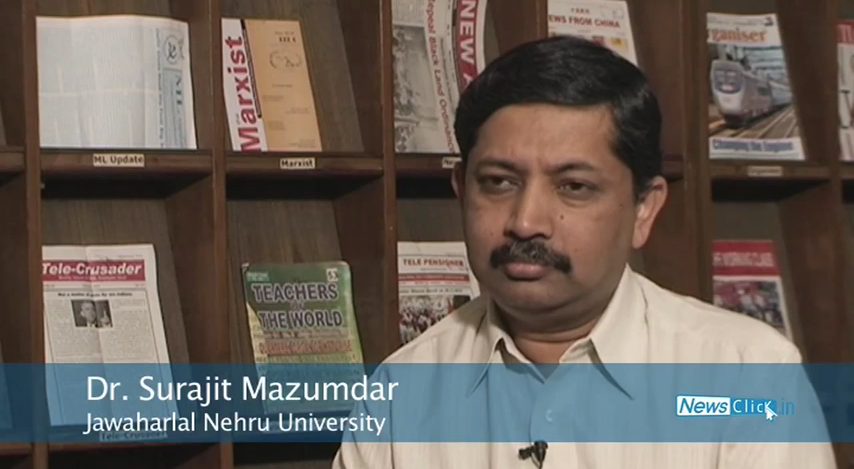
Rough Transcript
Pranjal: Hello and welcome to Newsclick. Today we are going to discuss budget which has been brought by Arun Jaitley today. To discuss this issue we have with us Prof. Suraji Mazumdar of JNU. Hello Surajit. So we have seen how Modi has been talking about good days. Do you think the good days are coming in this budget?
Surajit Mazumdar (SM): Well, the people of this country has voted out UPA in this last election in the expectation that they will see better days then what this budget indicates that hope would be belied because what we see in this budget as well as that budget that was placed last year in July last year by the Finance Minister is the continuation of the very same policies that were pursued by the UPA policies that were resulted in a situation where whatever growth has been happening have been cornered by small section of the society in the corporate sector and small sections of Indian society and B, has resulted in a situation where growth has also slowed because of the fact that there is not enough demand in economy for products of different sector. So that is likely to continue because this particular budget also indicates clearly the continuation of the same policy reflected in the fact that instead of approach of generating the tax revenues to increase public expenditure the thrust has been towards keeping the deficit low and taxes low at the expense of expenditure.
Pranjal: Sir, but there have been new taxes imposed say Swach Bharat cess has been imposed two percent on taxes also the service tax has been increased by two percent. While another corporate tax has been reduced by five percent. So how do you see it?
SM: Well, we have to look at the question of taxes by taking a sum total effect of the taxes. The sum total effect of the direct tax consumption is to reduce the tax that would have been generated. If there is anything of additional revenue that is coming from indirect taxes whereas the approach should be to generate more revenues from direct taxes. And if one looks at the actual tax revenue GDP ratio. That itself is very low. This is following a four year situation where revenues are actually been falling below the budget figures. What has been happening is that expenditure has been continuously cut in order to keep the deficit low despite the low revenue. So what was required was the significant ways to generate additional revenues so as to expand the public expenditure and that is completely missing and the thrust is on the opposite direction.
Pranjal: So the government has been continuously talking about increasing the employment opportunity not only in the urban areas but also in the rural areas. We have seen that there is no increase in funds for NREGA. The government is saying that it will be able to procure funds, so it will increase by 5000 rupees. Also, there have been no increase in the fund for food subsidy that needs to be given. So how do you see it. what part government is taking in when we consider social sector, or employment generation or the food subsidy.
SM: Well, as I said very clearly that if your attempt is to keep the expenditure level very low, then naturally the expenditure heads which are more sustainable to reduction will get hit. So, the expenditure on MNREGA is one expression of that if you look at subsidies, social sector expenditure, agriculture and rural development or the expenditure which effect the lives of the common people. They are suffering as a result of the approach of and this is not just now, it is a continuation of hits that expenditure has been taking for a succession of years because even during UPAs tenure there were am attempt at reducing the fiscal deficit which has primarily rested on trying to curb the expenditures of the government. So, successively this has been hit and if you look at the volume of the expenditure and GDP, they have contracted significantly over the last four or five years.
Pranjal: We have seen that government has been continuously talking about upliftment of people from schedule caste and schedule tribe. We have seen in the Rail Budget yesterday that they have introduced Nirbhaya funds for installing CCTV cameras for gender security in train. But if you look at the budget today, they have been declining the funds for SC, Sts and also in the gender budget. So the government is contradicting itself in every move. How do you perceive it?
SM: Well in this country, every time many policy is taken no matter who beneficiary is. The declared beneficiary is always supposed to be the common people of this country. If that was actually true, then the conditions of the normal India people would not have been what they are today. You have seen this. So government of course pay lip service to the interest of the common people to the contrast of schedule caste, schedule tribe, women but when it comes to taking actual policy measures which would make a substantive difference to these people, then you find that the governments are often lacking and the same is reflected lacking in this budget. The essential point is as long as you are going to remain committed to keeping expenditures low, this is the only way it will be. Because there are some expenditure heads which you can not adjust. It is these expenditure heads which are going to get adversely adjusted. And the effects on the economy as a whole because the economy is also growing slowly. Investment is down, depressed. So if you want to stimulate growth and output of employment in the economy, then do you need expansion of public expenditure. But, the emphasis has been essentially relying on private sector to invest, in the name of that you keep concessions to the private sector. They keep gobbling up those concessions but they don't necessarily deliver in the terms of benefits that are required for the people of this country.
Pranjal: Government has also said that by the end of this year, they plan to bring down inflation rate to say five percent per annum. What do you think how will they move on this part bringing down inflation which is comparitively very high at the moment of this.
SM: Inflation has been very high on number of year, it has come down a little in recent times but to great extent this is because of fortuitous factors like reduction of oil prices which has nothing to do with the Indian government policy. A second element which is responsible for the decline in inflation is that if you are going to squeeze the capacity of the people to buy things, squeeze demands that also has a depressing effect on prices. So if you are going to reduce inflation by squeezing the capacity of common people to buy things then that is not the solution to the problem of the inflation. It is the solution which is reproducing the same problem in a different way. So you have not yet seen any measure which will ensure that the inflation in the long run be contained along with the situation where there is an expansion of employment and income for the ordinary people which would require investment in things like public expenditure, investment in agriculture all of that has not really be forthcoming instead we see is that these expenditures have been so as to ensure that the fiscal deficit is kept on the check.
Pranjal: The government is also saying that the most of the funds will reach the state. So how is that going to happen?
SM: Well, there is a slight bit of slate of hand happening in this. Yes, under the arrangements of Indian Federalism the revenues that come to the centre are supposed to be shared with the states. And the percentage that was supposed to going to the state will now increases. But, apart from the revenues that is going to the state, you also had expenditures financed as those central revenues which were meant for the states. So the various centrally sponsored schemes. So the Central government also provided assistance to the states which used to appear as the expenditures of the Central government. So both the revenues as well as the expenditures involve transfers to the states. What you are getting now is that the revenue part is going to increase whereas the expenditure side is going to get cut. If you take both into account actually, what the states are going to get as a percentage of the total GDP, will be less than what have been budgeted last year. So, it is a false claim that the states are going to have more. If the revenues fall as they did last year then the states will be suffering even more because now the bulk of the revenue that states are going to get from the Centre are a percentage share of the Centre. If they fall short, states will also fall short.
Pranjal: So lastly Surajit, the fund on the social service has been reduced and additional corporate tax subsidy has been given to corporate we look at the background of this entire NDA government since it has come to power, it has been following a very pro corporate policies bringing FDI and the latest Land Acquisition Act. So will it be wrong to say or will it be right to say that this entire budget and this government is pro corporate and anti people?
SM: of that I don’t think there was ever any doubt and the corporate sectors’ backing of this particular government also played its part in ensuring that it was able to win the elections because a lot of resources were given. So in a sense it is a payback seen now. But the victims of that payback will ofcourse be the ordinary people of this country whose expectations of better days are surely not going to be met.
Pranjal: thank you Surajit for your time. We will be coming back to you on such issues. Thank you for watching Newsclick.
Get the latest reports & analysis with people's perspective on Protests, movements & deep analytical videos, discussions of the current affairs in your Telegram app. Subscribe to NewsClick's Telegram channel & get Real-Time updates on stories, as they get published on our website.











